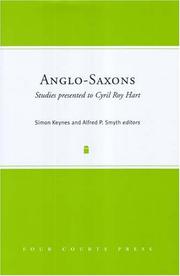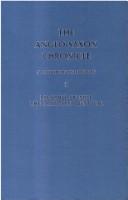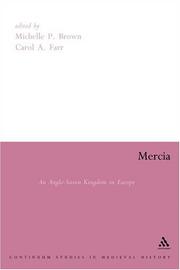| Listing 1 - 10 of 64 | << page >> |
Sort by
|

ISBN: 0199249822 9780199249824 Year: 2003 Publisher: New York (N.Y.): Oxford university press,
Abstract | Keywords | Export | Availability | Bookmark
 Loading...
Loading...Choose an application
- Reference Manager
- EndNote
- RefWorks (Direct export to RefWorks)
Great Britain --- History --- Great Britain - History - Anglo-Saxon period, 449-1066
Digital
Abstract | Keywords | Export | Availability | Bookmark
 Loading...
Loading...Choose an application
- Reference Manager
- EndNote
- RefWorks (Direct export to RefWorks)
Digital
Year: 1818 Publisher: London Printed for W. Clarke
Abstract | Keywords | Export | Availability | Bookmark
 Loading...
Loading...Choose an application
- Reference Manager
- EndNote
- RefWorks (Direct export to RefWorks)

ISBN: 1851829326 9781851829323 Year: 2006 Publisher: Dublin: Four Courts Press,
Abstract | Keywords | Export | Availability | Bookmark
 Loading...
Loading...Choose an application
- Reference Manager
- EndNote
- RefWorks (Direct export to RefWorks)
Anglo-Saxons --- Great Britain --- History --- Anglo-Saxons. --- Hart, Cyril Roy --- Great Britain - History - Anglo-Saxon period, 449-1066
Book
ISSN: 02706261 ISBN: 040461437X 9780404614379 Year: 1985 Volume: 7 Publisher: New York (N.Y.): AMS press,
Abstract | Keywords | Export | Availability | Bookmark
 Loading...
Loading...Choose an application
- Reference Manager
- EndNote
- RefWorks (Direct export to RefWorks)
Great Britain --- Grande-Bretagne --- History --- Bibliography --- Histoire --- Bibliographie --- Bibliography. --- Great Britain - History - Anglo Saxon period, 449-1066 - Bibliography

ISBN: 0859911047 9780859911047 Year: 1983 Volume: 4 Publisher: Cambridge: Brewer,
Abstract | Keywords | Export | Availability | Bookmark
 Loading...
Loading...Choose an application
- Reference Manager
- EndNote
- RefWorks (Direct export to RefWorks)
Book
ISBN: 9780713990645 9780140148237 014014823X 0713990643 Year: 2011 Volume: 2 Publisher: London: Penguin books,
Abstract | Keywords | Export | Availability | Bookmark
 Loading...
Loading...Choose an application
- Reference Manager
- EndNote
- RefWorks (Direct export to RefWorks)
449-1066. --- Great Britain --- History --- Great Britain. --- Grande-Bretagne --- Histoire --- Great Britain - History - Anglo-Saxon period, 449-1066
Book
ISBN: 0198859643 9780198859642 0191891991 019260340X Year: 2020 Publisher: London: Oxford university press,
Abstract | Keywords | Export | Availability | Bookmark
 Loading...
Loading...Choose an application
- Reference Manager
- EndNote
- RefWorks (Direct export to RefWorks)
The vernacular Anglo-Saxon Chronicles cover the centuries which saw the making of England and its conquest by Scandinavians and Normans. After Alfred traces their development from their genesis at the court of King Alfred to the last surviving chronicle produced at the Fenland monastery of Peterborough. These texts have long been part of the English national story. Pauline Stafford considers the impact of this on their study and editing since the sixteenth century, addressing all surviving manuscript chronicles, identifying key lost ones, and reconsidering these annalistic texts in the light of wider European scholarship on medieval historiography.0The study stresses the plural 'chronicles', whilst also identifying a tradition of writing vernacular history which links them. It argues that that tradition was an expression of the ideology of a southern elite engaged in the conquest and assimilation of old kingdoms north of the Thames, Trent, and Humber. Vernacular chronicling is seen, not as propaganda, but as engaged history-writing closely connected to the court, whose networks and personnel were central to the production and continuation of these chronicles. In particular,?After Alfred? connects many chronicles to bishops and especially to the Archbishops of York and Canterbury.0The disappearance of the English-speaking elite after the Norman Conquest had profound impacts on these texts. It repositioned their authors in relation to the court and royal power, and ultimately resulted in the end of this tradition of vernacular chronicling.

ISBN: 1283206358 9786613206350 1441153535 9781283206358 9781441153531 0826477658 9780826477651 0718502310 9780718502317 Year: 2003 Publisher: London New York Continuum
Abstract | Keywords | Export | Availability | Bookmark
 Loading...
Loading...Choose an application
- Reference Manager
- EndNote
- RefWorks (Direct export to RefWorks)
The kingdom best remembered for Offa and his famous dyke was not only a dominant power on the island of Britain in the eighth century, but also a significant player in early medieval European politics and culture. Although the volume focuses on the eighth and ninth centuries when Mercian power was at its height, it also looks back to the origins of the kingdom and forward to the period of Viking settlement and West Saxon reconquest. With state-of-the-art contributions from experts in palaeography, art history, archaeology, numismatics and landscape - as well as from historians - this book esta
Book
ISBN: 9780754663317 0754663310 9781315257259 9781351942485 9781138248199 Year: 2009 Publisher: Farnham, England: Ashgate,
Abstract | Keywords | Export | Availability | Bookmark
 Loading...
Loading...Choose an application
- Reference Manager
- EndNote
- RefWorks (Direct export to RefWorks)
| Listing 1 - 10 of 64 | << page >> |
Sort by
|

 Search
Search Feedback
Feedback About UniCat
About UniCat  Help
Help News
News